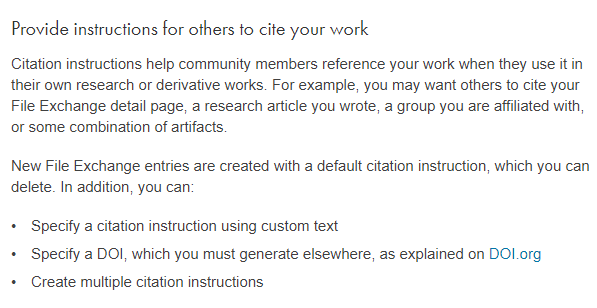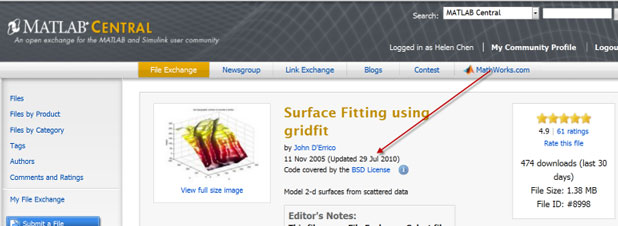New! Citations on the File Exchange
Citations make the world go around. I once read a (tongue in cheek) article about an improved design for scientific papers. In it, citations would go at the very beginning, because that’s actually what most people read first. <Flips rapidly to the last page> Did the author cite my work as an important precedent?! It’s a joke that points to a truth: giving credit where it’s due is one of the things that holds together communities of researchers.

If I reference a finding in your Nature article on crepuscular palm civets, I know just how to do it. But what if the work I am citing comes directly from the File Exchange? What should I say? This is a thing I found on the File Exchange? Somewhere I should probably mention your name and the URL, but how? Is it important to say when I downloaded it?
Or we can turn the problem around: how do you want other people to cite your work? You can work out a way to fit the key elements of the citation together, but you’d be happier knowing that you’re following a standard template. You’d be happier still if that template was provided by default so you didn’t have to fiddle with it at all. And you’d be deliriously happy if, on the rare occasions when it was necessary, you could customize the template to suit your needs.
My friends, I am here to make you deliriously happy. We have finally released the much-requested citations feature for the File Exchange. Here’s what it says on the “About File Exchange” page.

The DOI is a reference to a Digital Object Identifier as maintained by doi.org. The DOI system provides infrastructure for permanent citation identifiers. They let computers on the internet reason about citations in a straightforward way. If you need them, you’ll be glad to know our citations work with them. If you don’t need them, just use the default citation.
The first File Exchange submission to use our DOI functionality is this one on the modeling of planetary gears.
Huang, Jianfeng, et al. “A Generic Function for Automated Modeling and Feedforward Control of Planetary Gear Sets.” Journal of Dynamic Systems, Measurement, and Control, vol. 140, no. 10, {ASME} International, May 2018, p. 101007, doi:10.1115/1.4039859.
Here are the first few files to use the default File Exchange format.
- Alberto Comin (2018). NeurNetRegr (https://www.mathworks.com/matlabcentral/fileexchange/69084-neurnetregr), MATLAB Central File Exchange. Retrieved .
- JCBod Bodoque (2018). Change scale in stl text mesh file (https://www.mathworks.com/matlabcentral/fileexchange/69082-change-scale-in-stl-text-mesh-file), MATLAB Central File Exchange. Retrieved .
- Jiri Dostal (2018). EnergyPlus co-simulation toolbox (https://www.github.com/dostaji4/EnergyPlus-co-simulation-toolbox), GitHub. Retrieved .
- Usama Mehmood (2018). Cuboid fit (RANSAC) (https://www.github.com/usamamehmood3/Cuboid-Fitting-RanSAC), GitHub. Retrieved .
So there you go. Citations on the File Exchange.
And by the way, I really enjoyed your palm civet paper. First class work!








댓글
댓글을 남기려면 링크 를 클릭하여 MathWorks 계정에 로그인하거나 계정을 새로 만드십시오.